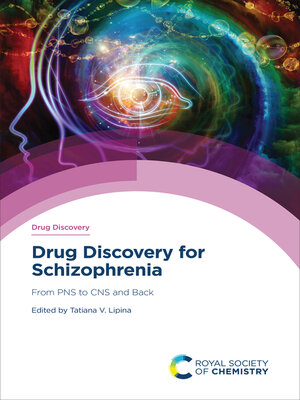Drug Discovery for Schizophrenia
ebook ∣ From PNS to CNS and Back · Drug Discovery Series
By Tatiana V Lipina

Sign up to save your library
With an OverDrive account, you can save your favorite libraries for at-a-glance information about availability. Find out more about OverDrive accounts.
Find this title in Libby, the library reading app by OverDrive.



Search for a digital library with this title
Title found at these libraries:
| Library Name | Distance |
|---|---|
| Loading... |
Following progress in schizophrenia since 2015, this new volume covers the advancing knowledge of scientists and clinicians in drug discovery. The book enhances our understanding of pathological neural communication between the peripheral nervous system (PNS) and central nervous system (CNS) in patients with schizophrenia. Although 75% of neural information passes through the PNS, interactions between the PNS and CNS in schizophrenia remain understudied. Consequently, the current view of schizophrenia requires improvement to facilitate diagnostics and drug development.
In this context, this second volume presents current evidence that views schizophrenia as a mild abnormal maldevelopment of the entire body. This includes impaired functioning of sensory systems (e.g. olfaction), and changes in blood biochemistry and the autonomic nervous system (e.g. vagal body-to-brain communication). Alternative approaches to prevent and treat schizophrenia involve advanced techniques such as opto- and chemo-genetics, as well as local administration of compounds (e.g. intranasally) targeting PNS-based cellular and molecular pathways. Chapters focus on the genetics of schizophrenia, leveraging technological advancements in high-throughput genomics and computational biology. These tools help identify novel therapeutic targets and enable the safe repurposing of existing medications.
The book emphasizes the need to develop new strategies for creating more suitable animal models of schizophrenia, considering the crucial role of the PNS in the disorder's aetiology. While PNS-based mechanisms are often overlooked, discussing them with caution is essential. Systematically accumulating knowledge about PNS-CNS pathological mechanisms will benefit psychiatric neuroscience, offering fresh perspectives for drug discovery.
Overall, the book synthesizes expert opinions from academia and clinical studies, covering progress in genetics/pharmacogenetics, molecular and cellular neuroscience, neurobiology, pharmacology and animal models.







